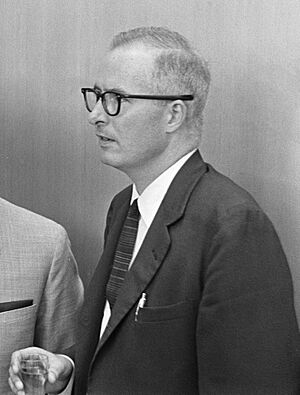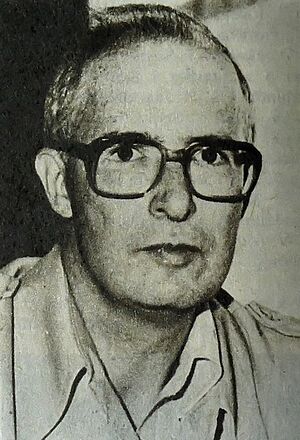Robert Byrne (chess player) facts for kids
Quick facts for kids Robert Byrne |
|
|---|---|

Byrne in Amsterdam, 1969
|
|
| Full name | Robert Eugene Byrne |
| Country | United States |
| Born | April 20, 1928 Brooklyn, New York, U.S. |
| Died | April 12, 2013 (aged 84) Ossining, New York, U.S. |
| Title | Grandmaster (1964) |
| Peak rating | 2605 (July 1973) |
| Peak ranking | No. 12 (July 1973) |
Robert Eugene Byrne (born April 20, 1928 – died April 12, 2013) was a famous American chess player and writer. He earned the top chess title of Grandmaster (GM). Robert Byrne won the U.S. Chess Championship in 1972. He also became a candidate for the World Chess Championship in 1974.
Byrne played for the United States nine times in the Chess Olympiads between 1952 and 1976. He won seven medals for his country. From 1972 to 2006, he wrote a popular chess column for The New York Times newspaper. Before becoming a full-time chess player, Byrne worked as a university professor for many years.
Contents
Robert Byrne's Early Life and Chess
Robert Byrne was born in Brooklyn, New York. He grew up in New York City with his younger brother, Donald. Both brothers were part of a group called the "Collins Kids." These young, promising players learned a lot from their coach, John W. Collins. Both Robert and Donald later became college professors. They were also among the best chess players in the United States. They were part of a new group of talented American players. This group included Larry Evans and Arthur Bisguier.
Robert Byrne played in his first big chess event in 1945. It was in Ventnor City, where he placed 8th. In 1946, he tied for first place in a section of the U.S. Open Chess Championship in Pittsburgh. His college studies meant he couldn't play chess as much for a few years. However, he did play for the U.S. in a radio match against Yugoslavia in 1950. In 1951, he played in the Maurice Wertheim Memorial in New York. This was a tough tournament with many top players.
Byrne became an International Master in 1952. This was because of his great results at the 1952 Chess Olympiad in Helsinki. He won a bronze medal there for his play on the third board. In the same year, he graduated from Yale University. He then became a professor of philosophy at Indiana University. His teaching job left him little time for chess. Still, he played for the U.S. in team matches against the Soviet Union. These matches were in New York in 1954 and Moscow in 1955.
Becoming a Chess Grandmaster
In 1957, Byrne tied for 4th place at the U.S. Open Chess Championship in Cleveland. He was just one point behind the winners, Bobby Fischer and Arthur Bisguier. Robert Byrne didn't play in his first U.S. Chess Championship until he was 30 years old, in 1958–59. He finished tied for 9th place. Bobby Fischer won that tournament.
But Byrne played much better the next year in the same event. He finished 2nd, ahead of strong players like Samuel Reshevsky and Pal Benko. Fischer won again. In 1960, Byrne started playing more seriously. He won the U.S. Open Chess Championship in St. Louis. He also won a silver medal at the Olympiad in Leipzig.
In the U.S. Championship of 1961–62, he tied for 2nd place. He was only half a point behind the winner, Larry Evans. In the 1963–64 U.S. Championship, Fischer famously beat Byrne in just 21 moves. Fischer also won that tournament with a perfect score. Byrne later wrote about this game. He said the winning move was so deep that even other Grandmasters thought he had a winning position.
In 1964, Byrne finished third at the Buenos Aires tournament. He was behind Paul Keres and the World Champion Tigran Petrosian. This strong performance earned him the title of International Grandmaster. Byrne tied for 2nd place in the U.S. Championship 1965–66. Fischer won again, but Byrne managed to beat Fischer in their game. He also shared the 1966 U.S. Open title with Pal Benko in Seattle. Byrne qualified for his first Interzonal tournament in Sousse in 1967. However, he didn't score enough points to move forward.
U.S. Champion and World Candidate
By the late 1960s, Robert Byrne was playing chess almost full-time. He won the 1972 U.S. Championship. He tied with Samuel Reshevsky and Lubomir Kavalek in the main tournament. Then, Byrne won the playoff match in Chicago in 1973.
Byrne reached a major highlight in his career in 1973. He finished third at the Leningrad Interzonal tournament. This made him only the fourth American player to qualify for the Candidates Tournament. The Candidates Tournament is a key part of the world chess championship process. In 1974, Byrne played his first Candidates' match against former world champion Boris Spassky. He lost the match by 1½–4½ in San Juan, Puerto Rico.
Because he was a Candidate in 1974, Byrne automatically qualified for the 1976 Biel Interzonal. He played very well there. He missed a chance to play in a tie-breaker by only half a point. He tied for 5th place, just behind the top players.
Robert Byrne at the Olympiads
Robert Byrne played for the United States team nine times in the Chess Olympiads. He won seven individual and team medals. Here are his detailed results:
- Helsinki 1952: Played on board 3, scored 10½ out of 15 points. Won a bronze medal for his board performance.
- Leipzig 1960: Played on board 3, scored 12 out of 15 points. Won a silver medal for his board performance and a team silver medal.
- Varna 1962: Played on board 4, scored 8½ out of 13 points.
- Havana 1966: Played on board 2, scored 6½ out of 13 points. Won a team silver medal.
- Lugano 1968: Played on board 4, scored 7½ out of 12 points.
- Skopje 1972: Played on board 2, scored 9½ out of 14 points.
- Nice 1974: Played on board 2, scored 12 out of 16 points. Won a team bronze medal.
- Haifa 1976: Played on board 1, scored 7 out of 10 points. Won a team gold medal.
- Buenos Aires 1978: Played on board 4, scored 4 out of 8 points. Won a team bronze medal.
Later Career and Chess Legacy
When Robert Byrne became a chess columnist for The New York Times in 1972, he played less often. However, he still won tournaments in Torremolinos (1976–77), Harare (1983), and Lagos (1993). He also wrote often for Chess Life magazine. This is the official publication of the United States Chess Federation. He led the USCF's committee for masters and was one of its vice presidents. Robert Byrne was added to the U.S. Chess Hall of Fame in 1994.
Throughout his career, Byrne kept getting better in major chess events. This included the U.S. Open, the U.S. Championship, the Olympiad, and the Interzonal. He also created new ideas in several chess openings. For example, he was the first to play 6.Be3 against the Najdorf Variation of the Sicilian Defense. This move is now named after him and is very popular. He also developed a new way to play the King's Indian Defense. This involved a quick attack on the queenside for Black. He also used the Dutch Defense successfully, even when it was not a common opening for top players. Robert Byrne played competitively until he was 74 years old in 2002. He retired from writing his chess column when he was 78.
Death
Robert Byrne passed away in 2013 at his home in Ossining, New York. He had been battling Parkinson's disease.
Notable Chess Games
Here are some of Robert Byrne's most famous chess games:
- David Bronstein vs Robert Byrne, Helsinki Olympiad 1952, Queen's Gambit Accepted (D24), 0–1 A very impressive win against the player who was the World Finalist in 1951.
- Robert Byrne vs Miroslav Filip, Mar del Plata 1961, King's Indian Defense, Fianchetto Variation (E60), 1–0 Byrne beats a player who became a World Candidate the next year.
- Miguel Najdorf vs Robert Byrne, Buenos Aires 1964, King's Indian Defense, Classical / Petrosian Variation (E93), 0–1 A very important win from the tournament where Byrne became a Grandmaster.
- Bobby Fischer vs Robert Byrne, U.S. Championship, New York 1965–66, French Defense, Tarrasch / Guimard Variation (C03), 0–1 Byrne finds a very smart move to defeat the amazing Bobby Fischer.
- Robert Byrne vs Leonid Stein, Sarajevo 1967, Sicilian Defense, Accelerated Dragon Variation (B35), 1–0 Byrne beats the Soviet champion Stein in one of his favorite chess openings.
- Vladimir Savon vs Robert Byrne, Moscow 1971, King's Indian Attack (A07), 0–1 Another Soviet champion loses to Byrne in Moscow.
- Samuel Reshevsky vs Robert Byrne, U.S. Championship Playoff, Chicago 1973, King's Indian Defense, Classical Variation (E92), 0–1 A key win that helped Byrne qualify for the Interzonal later that year. Reshevsky made a mistake that allowed Byrne to win with a queen sacrifice.
- Bent Larsen vs Robert Byrne, Leningrad Interzonal 1973, King's Indian Defense, Saemisch Variation (E80), 0–1 Byrne upsets one of the tournament favorites by attacking Larsen's center.
- Robert Byrne vs Mark Taimanov, Leningrad Interzonal 1973, Sicilian Defense, Taimanov Variation (B46), 1–0 Byrne wins against Taimanov's well-known defense.
- Jan Timman vs Robert Byrne, Nice Olympiad 1974, Queen's Gambit Declined (D53), 0–1 One of the strongest young Grandmasters learns to respect the experienced Byrne.
- Robert Byrne vs Viktor Korchnoi, Moscow 1975, Pirc Defense, Austrian Attack (B09), 1–0 Korchnoi was in great form during this time, leading to two world championship challenges later.
- Robert Byrne vs Vasily Smyslov, Biel Interzonal 1976, French Defense, Winawer / Positional Variation (C19), 1–0 Byrne wins with a chess line that Smyslov himself made famous years before.
- Robert Byrne vs Joel Benjamin, U.S. Championship, Berkeley 1984, Sicilian Defense, Classical Richter–Rauzer Variation (B60), 1–0 Benjamin didn't develop his pieces well and paid the price.
Books by Robert Byrne
- Beginning Chess (1972)
- Both Sides of the Chessboard (1974) (with Iivo Nei)
- New York Times Book of Great Chess Victories & Defeats (1990) (a collection of his newspaper columns) ISBN: 0-8129-1884-3
 | George Robert Carruthers |
 | Patricia Bath |
 | Jan Ernst Matzeliger |
 | Alexander Miles |


